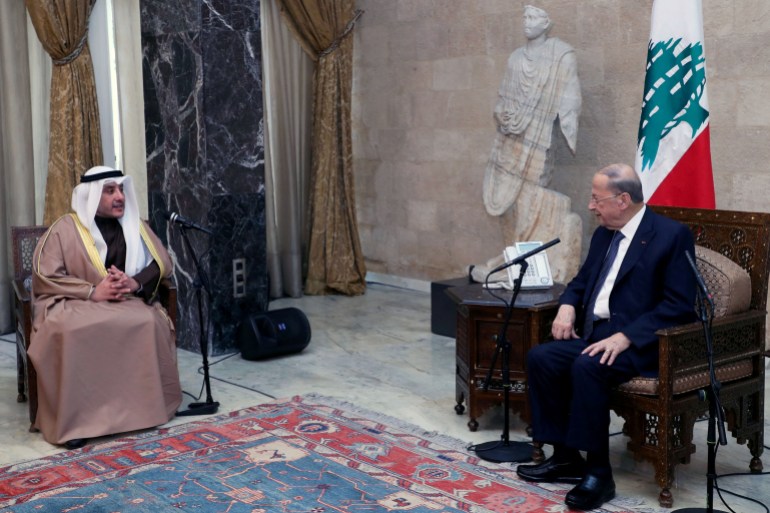Lebanese Foreign Minister Abdullah Bouhabib said that the Kuwaiti initiative, which his Kuwaiti counterpart, Sheikh Ahmed Nasser Al-Mohammed Al-Sabah, conveyed to Beirut, and aims to build confidence between Lebanon and the Gulf states, consists of 12 items and does not carry any conditions.
Bouhabib added in a press statement on Sunday that the Kuwaiti paper is for understanding how to implement United Nations resolutions on Lebanon.
He added that the Kuwaiti initiative is a paper of understanding for Lebanon's interest and for the greater Arab interest.
The Lebanese Foreign Minister also affirmed that there is Kuwaiti hope that Beirut will provide answers to the items of the initiative to be discussed during the next meeting of Arab foreign ministers.
Kuwaiti Foreign Minister Sheikh Ahmed Nasser Al-Mohammed Al-Sabah arrived in Beirut on Saturday and met his Lebanese counterpart Abdullah Bouhabib and Prime Minister Najib Mikati, and on Sunday he held talks with President Michel Aoun at the Baabda presidential palace.
Al-Sabah's visit comes 3 months after a crisis erupted between Lebanon and the Gulf countries, against the backdrop of statements by former Lebanese Minister of Information George Kordahi regarding the Yemen war.
Aoun receives the Kuwaiti Foreign Minister at Baabda Palace in Beirut (Reuters)
The content of the Kuwaiti initiative
In statements he made in Beirut, Kuwaiti Foreign Minister Sheikh Ahmed Nasser Al-Mohammed Al-Sabah said that he carries 3 messages to Lebanon, indicating that the Kuwaiti move is being coordinated with the Gulf countries to support Lebanon.
Al-Sabah said that the messages are to support Lebanon, in order that it not be a platform for aggression, and that it fulfill its pledges.
He added that there is a mutual desire for Lebanon to regain its glory by not interfering in Gulf affairs.
After his meeting with Lebanese President Michel Aoun, the Kuwaiti Foreign Minister said that he discussed what he called ideas and measures to build confidence again with Lebanon, and expressed his hope that a response to them would come soon.
For his part, the Lebanese President expressed his country's welcome to any Arab move to restore relations between Lebanon and the Gulf states to normal, stressing that the ideas presented by Sheikh Ahmed Nasser Al-Mohammed Al-Sabah will be the subject of consultations to announce the appropriate position on them.
The Lebanese Prime Minister Najib Mikati stressed - during his meeting with the Kuwaiti Foreign Minister on Saturday - the need to restore the strength of relations between Lebanon and the Arab countries.
According to Lebanese government sources, the ideas presented by the Kuwaiti minister to Lebanese officials include Lebanon activating what is known as a policy of disassociation from regional conflicts, respecting the sovereignty of Arab and Gulf countries, implementing international resolutions, in addition to preventing drug smuggling into the Gulf countries.
In turn, Reuters quoted diplomatic sources as saying that the proposals include Lebanon's commitment to the Taif Agreement, the implementation of Security Council resolutions, and the holding of elections on time.
The sources told the agency that the proposals also included tightening controls on exports to the Gulf to prevent drug smuggling, and cooperation between agencies.
Causes of the crisis
The crisis between Lebanon and the Gulf states dates back to October of last year, when a recorded interview was published by the then Minister of Information, George Kordahi, before taking office, in which he described the Yemen war as absurd.
These statements provoked Gulf anger, which was expressed by the summoning of Saudi Arabia, the UAE, Bahrain and Kuwait to their ambassadors from Beirut for consultations, and then quickly followed by a request for the Lebanese ambassadors accredited to these countries to leave their capitals, in addition to Riyadh stopping its imports from Lebanon.
The Lebanese government has made efforts to heal the rift, and asked major capitals, such as Washington and Paris, to mediate in order to curb the deterioration in relations with the Gulf states.
On the third of last December, Minister George Kordahi submitted his resignation from his position, as a "goodwill gesture to resolve the crisis";
This came on the eve of French President Emmanuel Macron's visit to Saudi Arabia.
During Macron's visit to Jeddah, and his meeting with Saudi Crown Prince Mohammed bin Salman, a phone call was made with the Lebanese Prime Minister, Najib Mikati, who was said to break the ice;
But no further steps have been followed since then.

